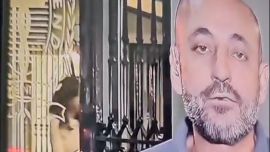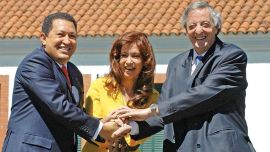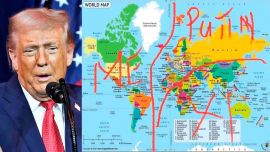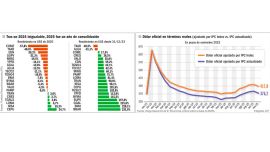Bolivia's Supreme Electoral Tribunal on Thursday disqualified exiled former president Evo Morales from running for a Senate seat in May's general election, saying he did not meet residency requirements.
Morales, who resigned as head of state in November, is barred by law from seeking the presidency but had wanted to run for a seat in the Senate. He is currently living in exile in Buenos Aires, Argentina, having fled Bolivia in November after resigning as president following three weeks of protests at his controversial re-election.
The Supreme Electoral Tribunal (TSE) said Morales's candidacy lacked the necessary documentation, but it said that his Movement for Socialism (MAS) party's presidential candidate, Luis Arce, met the qualification requirements.
Tribunal head Salvador Romero said at a press conference the decision cannot be appealed with the electoral board, though he added that Morales "can explore any judicial routes he sees as pertinent.”
MAS party leaders are expected to appeal the ruling to the Constitutional Tribunal.
Morales tweeted that the decision against him was "a blow to democracy" and that members of the court "know that I meet the requirements to be a candidate."
"The ultimate goal is to prohibit MAS," he added.
The country remains bitterly divided following the often-violent tumult that erupted before and after Morales was pushed to resign. Polls show MAS emerging as the early favourite over a fragmented opposition with eight presidential candidates.
Arce leads the pack of presidential contenders with 31.6 percent of the vote among those who plan to participate in the election, according to a recent survey by pollster Ciesmori. He is followed by centrist candidate Carlos Mesa with 17.1 percent and Bolivia's conservative interim leader Jeanine Añez who has 16.5 percent. Regional civic leader Luis Fernando Camacho, a major leader of right-wing protests in the eastern economic centre of Santa Cruz, is also set to run.
Bolivia's general election campaign officially began on February 3 and comes on the heels of the October election when results were annulled after an audit by the Organisation of American States (OAS) found evidence of vote-rigging in Morales' favour.
After hearing Thursday's decision, MAS spokeswoman Marianela Paco told The Associated Press the party will not make a statement until it knows the exact arguments for Morales' disqualification.
"We are going to wait to be notified with the resolution and we will analyse the arguments before speaking," she said.
The tribunal did accept the presidential candidacy of former economy minister Luis Arce of MAS, who also faced a demand seeking his disqualification.
Besides Arce, the other presidential contenders for the May 3 election include centrist former President Carlos Mesa, who finished second in the October vote; interim President Jeanine Áñez, whose administration has worked to overturn many of Morales' policies and prosecute his allies; and Regional civic leader Luis Fernando Camacho, a major leader of protests in the eastern economic center of Santa Cruz.
– TIMES/AFP/AP





















Comments